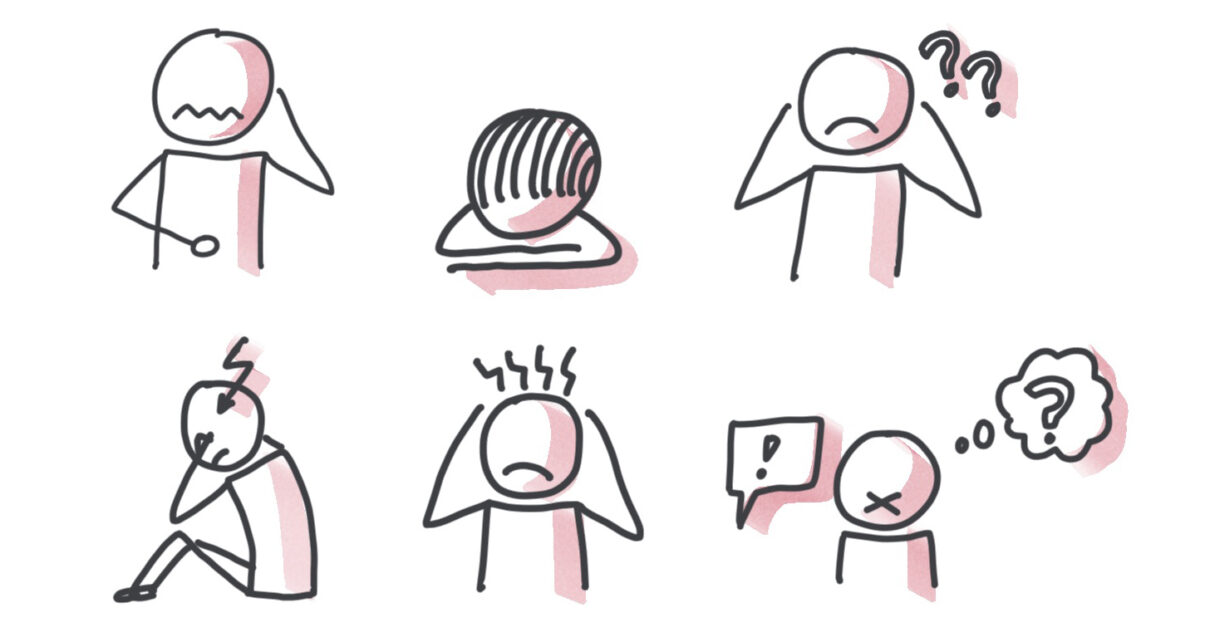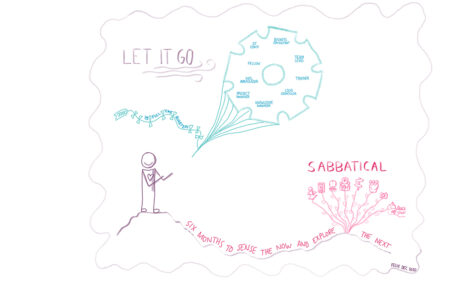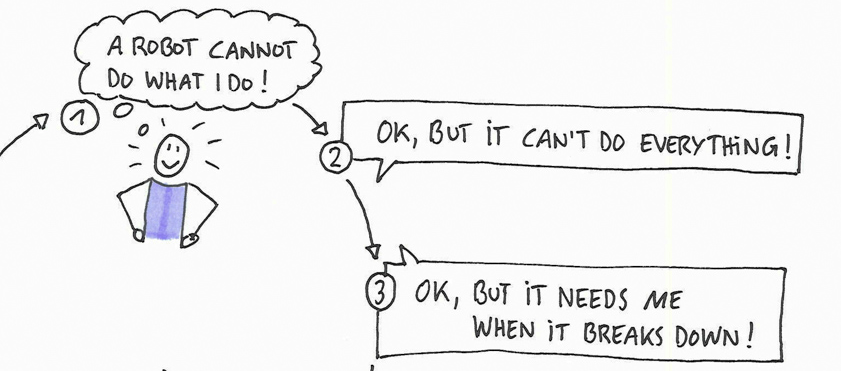For most of us, it’s the first time that we have to work for a more extended time from home.
I usually work one day per week from my home office. For all of us, it’s the very first time that we have to confront a global pandemic. Everyone faces this new situation differently and reacts depending on, e.g. personality, living conditions, culture, experience with remote work, exposure to crises.
As Plato said: “Human behaviour flows from three main sources: desire, emotion, and knowledge”. Co-workers and peers have shared the following emotions during conversations and meetings last week:
- I feel anxious / fear
- I feel frustrated/disappointed
- I feel lonely/isolated
- I feel overwhelmed / desperate
- I feel interrupted/restless
- I feel confused/uncertain
I want to address them because as a leader I would like to do everything possible in my circles of influence and control to bring my family, friends, neighbours, team, and colleagues safe through this crisis.
Some companies work “digital-first” and do not even have a headquarter. I’m a continuous learner. So, what can we learn from them regarding remote leadership? I’ve curated a dozen of articles from 100% remote companies, done a synthesis of their findings and share the insights in this article. It’s my reflex to do the right thing. Please check the sources at the end of the post.
Of course, I’m aware that I’m not writing for people who are currently working day and night in hospitals, nurseries, elderly homes, first aid stations, groceries, logistics, or production of essential goods. We stay home to flatten the curve. This behaviour is our contribution to support the work of these people during this crisis. Our response works best when we put the needs of others first. Be self-aware, and building empathy helps me a lot.
Challenge “I feel anxious / fear”
My father is close to 80 years old and unfortunately not in good health any more. My mother has just celebrated her 77th birthday. We had a video chat to send our best wishes. They live in a flat together, a 4-hour drive away from our home. No possibility to visit them. A neighbour takes care of shopping for them. Of course, I feel anxious that the virus could enter their flat and threaten their lives. I hope that they manage to keep COVID-19 away. Feelings of anxiety and fear are typical in a time of crisis. How can we cope with those feelings?
Culture
- Encourage mindfulness practices. It calms your mind to, e.g. practice meditation and journaling.
Communication
- Limit the consumption of news about the crisis
- Talk with people you trust about your feelings
- Share the helpline information for employee assistance programs
Context
- Focus on your circle of influence and control
- Practice thinking tools like, e.g. mental subtraction
Challenge “I feel frustrated / disappointed”
Being forced to stay home for many weeks includes many triggers for frustration, it may even lead to cabin fever. If a crisis blocks you from reaching the desired outcome, it’s ok to become frustrated. Examples of desired situations are you love to meet your colleagues in the office, or you want to visit family and friends. We have all not been hired for remote work under crisis conditions. So what could we do?
Context
- Reframe the situation, collect ideas on “for what is the current situation good?”
- Find alternatives to achieve similar outcomes under the given constraints
- Focus on what is in your circle of influence and accept what is outside of your control
Challenge “I feel lonely / isolated”
About 25% of households in Germany consist only of one person. Many of your employees live alone at home. Feeling lonely is already a challenge in “normal” times if you have to work 100% for home. Nothing takes the place of a face-to-face conversation. The companies running in 100% remote mode share tips like “hire people who have the right support system at home”, “try working in co-working spaces or coffee shops”, “be more intentional about joining local groups or organizations”. Physical distancing implies a drastic reduction of social contacts: you are not allowed to visit friends, you cannot meet in restaurants because they are closed, the gym is not available. So, some will feel lonely. How can you address loneliness?
Culture
- Don’t be afraid to ask for help when working remotely
- Make time for connection with neighbours, friends, family, colleagues
- Rebuild contact with people you have not met for a long time
- Introduce remote happy hours or “What’s up Monday” asking people how their weekend was
Communication
- Adress loneliness in team meetings and ask employees to share how they protect themselves from feeling isolated
- Do more one on ones especially with the silent colleagues
- Include social breaks in your schedule, small talk and casual check-ins can also be done via video chat
- Introduce a watercooler talk to have communication about other topics than deadlines, deliverables, issues
- Start random discussions
- Use emojis, try and capture how people are feeling, e.g. I did a round-robin asking “I feel… I hope…”
- Share positive feedback more often than usual.
Challenge “I feel overwhelmed / desperate”
The confinement leads to situations where you feel overwhelmed: change of daily job activities, homeschooling for kids, re-structure the regular schedule, or you need to take many new decisions. These days and weeks are stressful even for the best “self-managers”.
Culture
- Trust your team
- Encourage an atmosphere and culture of regular breaks and moments to relax
- Create a healthy boundary between your work and personal life, e.g. blocking your calendar for the end of the day or blocking out own time during the day
- Nurture a culture of doing experiments and taking smart risks
Communication
- Adress “working too much” in team meetings and ask employees to share how they protect themselves from feeling overwhelmed
- Be transparent with your team on when you’re available
Context
- Release the “40 hours per week” model because the days need a new structure, don’t expect anybody to work from 9 to 5
- Set a work schedule or routine that fits your needs and those of the people you live with
- Scope the work with a focus on key results
- Document processes, “how-tos”
- Clarify expectations and deliverables
- Stay true to your project management tracking and systems of accountability you always use
- Create a dedicated workspace and keep an organized work desk
Challenge “I feel interrupted / restless”
There is no way to escape: you and your team members will feel interrupted. There are three types of interruptions:
- Triggered by your work environment, e.g. if you live with young kids who will keep interrupting you
- Triggered by your virtual settings, e.g. if you receive notifications on your mobile phone
- Triggered by your mind, e.g. if suddenly you think about “oh, I’ve also to do this”
Under the current conditions of #stayathome with no available childcare, it’s not possible to avoid interruptions. Of course, you may explain to your family why it’s essential for you to prevent intrusions, or gradually train your kids to occupy themselves. Or you have a look at your daily schedule, and find the quality time to “eat the frog”, i.e. your frog is the most crucial task that you cannot afford not to deliver. This time could be when your kids are still sleeping.
The most straightforward category to tackle is the virtual one:
- You may turn off notifications
- Set up a clear signal that lets your colleagues know when you don’t want to be disturbed
- Block sites that distract you
- “Make Time” by Jake Knapp and John Zeratsky offers a lot of excellent tips on how to focus on what matters every day.
To reduce the last distraction category, you may start with a look at your desk and create a distraction-free environment by removing stuff that catches your attention. To limit the impact of thoughts popping up, use techniques to organize your to-dos like, e.g. “Getting Things Done” by David Allen. And to become better at handling a stormy mind, use mindfulness methods.
In general, limit the number of tasks you plan to do each day. Leave space in your calendar, keep consistent work hours, and include breaks into your daily schedule. Only a few people can work focussed more than 45 to 60 minutes in a row. There will be unexpected activities, and interruptions will catch your attention. It’s essential to manage your attention because energy is where the focus is.
Challenge “I feel confused / uncertain”
The probability is high that people will feel disconnected and the longer the situation endures also confused if your team is accustomed to meet frequently face to face.
Therefore, it’s vital that you offer clarity and ways to connect better. There are a few essential activities that you can do along the dimensions of culture, communication, and context.
Culture
- Build new rituals based on a remote-first mindset
- Establish multiple touchpoints to increase the level of interaction with and between your team members
Communication
- Adapt to the communication preferences of each individual
- Ensure your communication is predictable and consistent
- Re-clarify the communication channels, so be specific about when to use what
- Make sure that the team members know what’s going on
- Check the need for meetings
- Send meeting requests to allow for preparation time, and communicate agenda, goals
- Balance airtime so each team member feels heard and seen
- Endure silence in meetings
Context
- Show the big picture by sharing the strategy, goals, key results, and progress your team is working toward
- Re-align on mutual expectations with team members and explain the “Why”
- Document routines, processes, meeting outcomes, and learnings from projects
- Use collaborative features of task and project management tools
Continuous learning
You overcome challenges by making yourself bigger. It’s undoubtedly a challenging time for everybody. Therefore, I appreciate the many opportunities to learn from other leaders. “How to Navigate Uncertainty” with Jochen Gürtler from the School of Becoming initiated by Ingo Rauth has been a highlight this week.
And what have you learned during the first weeks of lockdown and forced remote work?
Sources
Please follow the blogs who have served as data points for this synthesis.
- “The 7 Biggest Remote Work Challenges” Follow @melaniepinola
- “How to Build Team Culture When Your Employees Work From Home” and “How to Manage Remote Teams” Follow @toggl
- “A Crash Course in Remote Management” Follow @wordpressdotcom
- “So You’ve Been Told to Work From Home. Now What” Follow @doist
- “GitLab’s Guide to All-Remote” Follow @gitlab
- “Remote Work for Design Teams: InVision’s Essential Resources” Follow @lizsteelman
- “15 Questions About Remote Work, Answered” Follow @hbr
- “Working Remotely: A Complete Guide to Turn You Into a Pro” Follow @paymo
- “Leading Remote Teams” Follow @wisemangroup1




